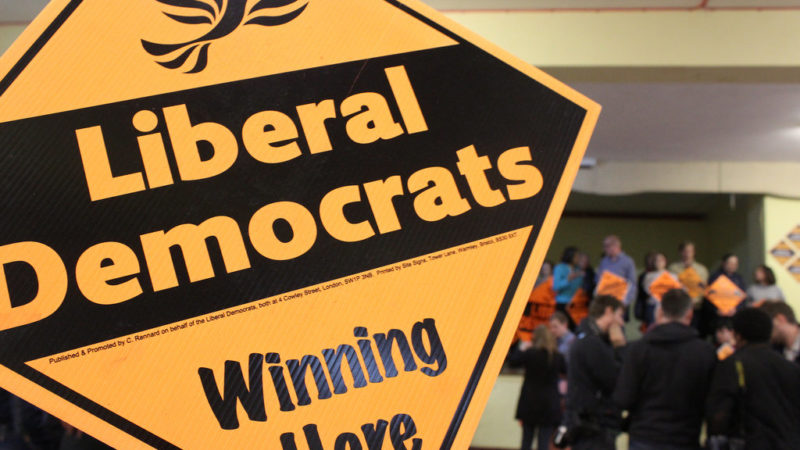The leadership contenders are looking left but the right of the party remains influential .

Liberal Democrats will not announce their new leader until summer 2021, but already all the declared candidates are showing signs of a desire to move the party to the left.
Layla Moran wants to trial Universal Basic Income (UBI). Acting leader Ed Davey wants a ‘recovery UBI’. Wera Hobhouse has explicitly said that the party should stop splitting the difference between the two major parties and commit to a centre-left identity. And a possible fourth candidate, new MP Daisy Cooper was a firm critic of austerity under the Lib Dem-Tory coalition government.
The call for a new approach, and possibly radically progressive policies, reflects a wider trend in British politics. Jeremy Corbyn’s leadership has opened up the possibilities for more redistributive policies and an active state.
Pragmatically it taps into a deep-rooted anxiety within the Lib Dems about its ongoing failure to make a dent in the public’s consciousness. Bold new policies are often cited as the way to raise the party’s profile. Profile-raising became a preoccupation when the party made little headway in the 2017 general election despite a strong anti-Brexit message. And a raised profile is now an urgent matter of political survival after the calamity of the last election.
Building a brand that appeals to left-wing voters will be helped by the slow disappearance of members of the Coalition government from Lib Dem frontline politics, an association whose persistent toxicity damaged Jo Swinson during the last general election campaign.
Ed Davey is the only major player still vulnerable to this line of attack. Although this attack will naturally weaken as 2010-2015 becomes more distant and coronavirus makes everything before the pandemic seem a lifetime ago.
However, even if the new leader moves to the left, there will still be a large section of the membership, perhaps a large minority, who still see its rightful place as a party of the liberal centre.
Belief in a small state and free markets may in fact prove more enduring in the Liberal Democrats than in the Conservatives. The Tories have shown in recent years that the pursuit of power trumps almost any prior founding principles. Also, their newest voters, pinched from Labour, favour public spending.
The liberal centre has abided despite the (arguable) disaster of the Coalition, whose most high-profile members were all contributors to the 2004 classical liberal revivalist essay collection the Orange Book.
Lib Dems tend not to blame the Orange Bookers for the collapse of its Parliamentary presence and contamination of the party’s brand – with not even the slightest piece of compensatory electoral reform – that occurred under its watch.
For their part, economic liberals arguably have nowhere to go if the party turns left. Though many like David Laws share their free market economics with the Tories, they are put off by that party’s historic social illiberalism, emphasised by the recent re-emergence of the nasty party. Small statists consider the Lib Dems their natural home.
Many ‘bold new policies’ like Universal Basic Income will therefore meet with opposition in the Lib Dems.
Layla Moran claims that UBI has ‘widespread support’, and it is true that a policy for trialling a scheme was passed at the 2019 autumn conference. But Moran’s announcement of this policy on the LibDemVoice blog received a large number of comments, many critical, concerned with the implications for government spending.
Among the right, there is support for a negative income tax instead. Other critics argue that properly providing a liveable income – far more than the £50 a week suggested by Davey– necessarily means putting huge amounts of money in the pockets of those who don’t need it, at government expense.
However, internal opposition is not necessarily a bad thing, particularly if it helps the next Liberal Democrat leader to define themselves in opposition to the past and holding the solutions to an increasingly bleak-looking future.
To this end, policies like UBI help to signal its future direction of travel. It is arguably is not that radical, at least in many of the forms proposed, but it sounds it.
Other genuinely progressive but overlooked Lib Dem policies, such as on education and childcare provision, need to be framed in similarly bold terms.
A combination of transformative policies combined with shedding the baggage of the Coalition could help the Liberal Democrats to attract left-wing voters and build alliances with parties on the left and centre-left.
Sam Martin is a Lib Dem member based in Sutton, South London
Left Foot Forward doesn't have the backing of big business or billionaires. We rely on the kind and generous support of ordinary people like you.
You can support hard-hitting journalism that holds the right to account, provides a forum for debate among progressives, and covers the stories the rest of the media ignore. Donate today.



